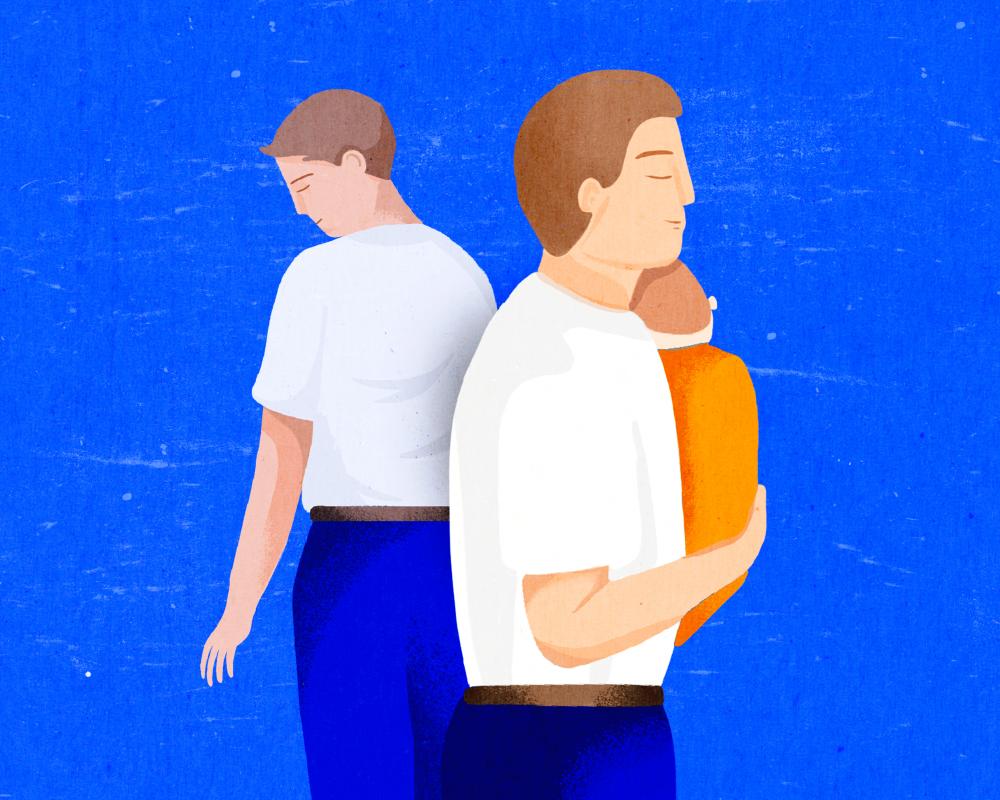
Dean Rogut kept everything under control.
For the first time, he became a father, yet things didn’t go as expected. When his wife reached 12 weeks of pregnancy, she needed to be on bed rest. Then at 24 weeks, they welcomed their son, Max, earlier than planned.
Tolong support kita ya,
Cukup klik ini aja: https://indonesiacrowd.com/support-bonus/
As the weeks went by, things were hard. There were times when they thought they might lose Max. Throughout that period, in and out of the NICU watching their tiny baby, Rogut took “the very male supporting role”. He supported his wife. He was the point of contact if anyone needed to know what was going on. But it felt as though he was in a sensory deprivation tank. He became detached from everything and anything. “I was very much in survival mode – but trying to keep everyone else sort of above water.”
The staff would check in and inquire, “How’s Mum faring today?” Nobody bothered asking about Rogut unless his outspoken spouse prompted them to. While his friends reached out, there wasn’t much assistance they could offer. Midway through the 121 days Max stayed at the hospital, his wife received a diagnosis of postnatal depression, enabling her to receive some support.
Related:
“I wasn’t aware men could experience it”: The concealed effects of male postnatal depression
But sure, there wasn’t anything truly suited for me.
Max arrived in March, and they brought him home sometime in July. The newcomers settled into a daily rhythm. Rogut tackled challenges head-on, supporting his spouse. Friends surrounded him during this time. From an outsider’s perspective, things seemed to be going well for him; he appeared to be thriving as a father.
“I wasn’t aware of how severe my condition had become until around November or December when I reached my limit.” At this point, he sank into clinical depression and experienced suicidal thoughts. He admitted himself to a hospital.
***
A baby is a wonderful occurrence. However, for many decades, following extensive advocacy efforts, experts and healthcare providers have acknowledged that the birth of a child can simultaneously be a daunting, harrowing, and confusing experience for new mothers.
As many as one in five new mothers
Women may experience perinatal anxiety or depression. Consequently, they undergo mental health screenings at various predetermined stages along the structured healthcare journey, starting from confirming their pregnancy until their child’s regular vaccinations. Although maternal mental health continues to be a significant issue, measures have been put in place to address this concern.
-
Subscribe to a weekly newsletter highlighting our top picks.
There isn’t currently a specific support system tailored for fathers. Moreover, growing evidence indicates that approximately one in ten dads encounter significant mental health challenges during the time leading up to and following the birth of their child. This research further reveals that these effects aren’t only detrimental to the fathers themselves; they also profoundly impact their partners and offspring.
We don’t have a society where we embrace fathers as openly as we do mothers during those initial phases,” explains Jacqui Macdonald, an associate professor at Deakin University and leader of the Australian Fatherhood Research Consortium. “The focus tends to be on fathers supporting the mother rather than discussing what kind of assistance is available specifically for them.
This indicates that fathers such as Rogut – though this isn’t exclusive to individuals with traumatic pasts – may fall between the cracks.
According to Associate Professor Richard Fletcher, who heads the Fathers and Families Research Program at the University of Newcastle, when considering the difficulties faced by new fathers, he explains, “The situation they encounter before their child is born can be likened to finding themselves in a barren desert without realizing how parched they are, with absolutely no access to water.”
The fathers are cut off from just about anything.
This issue isn’t confined to just Australia. In 2018, Dr Sharin Baldwin performed a comprehensive analysis of perinatal mental health within the UK. “The striking aspect,” she notes, “is how frequently fathers experience feelings of invisibility or exclusion during this time.” Concurrently, these dads faced issues related to shifts in self-identity and partnership dynamics, as well as grappling with economic strain and balancing professional responsibilities against personal life. She adds that little progress has been made in addressing these concerns since her study was published.
numerous males quietly endure one of life’s biggest changes.
Families function as interconnected units rather than separate entities; hence, when one component within this unit faces significant challenges, the overall functionality suffers,” explains Macdonald. “By ensuring support for the father, he can become an effective contributor to caregiving. He then collaborates with the healthcare network to assist both the mother and child, provided that his own needs have also been adequately addressed.
***
The figure of 10% of new fathers experiencing mental health difficulties, such as anxiety and depression, is an estimation. One reason, says Macdonald, is “we don’t really have proper screening anywhere for new fathers”. The second is that male depression often looks quite different from perinatal depression in women.
What we observe is a strong link between experiences of anger,” she explains. This does not automatically imply aggression, only that there is an underlying sense of anger within individuals. “For fathers, it could be seen as constructive—a perception that they have the drive to handle things; to combat feelings of depression and sorrow—but this requires support.
Throughout their lives, women have been socially conditioned toward motherhood, whereas such conditioning has been less prevalent for men.
Associate Professor Jacqui Macdonald
A
a recent comprehensive analysis of fathers’ methods for dealing with stress
Identified among fathers is a group that MacDonald refers to as “dual copers” – men who appear to be thriving but harbor unresolved distress beneath the surface. These male dual copers frequently engage in avoidance tactics. Activities that serve as distractions and help lessen the emotional weight of their experiences might include behaviors such as drinking alcohol.
The review aligns with Baldwin’s observations in the UK, stating: “Fathers might exhibit their distress as anger, irritability, or conflicts, often accompanied by avoidance behaviors such as excessive work, smoking, gambling, or heightened engagement in pursuits like sports or sexual activity.”
When Macdonald and his team followed a group of male caregivers who were managing both work and childcare during the pandemic, the research revealed higher levels of depressive symptoms compared to those observed in other fathers.
But when people look at them, they think ‘Oh, you appear to be managing well… We won’t probe further,'” she explains. “My concern is that this is where we might begin to notice an increased risk of suicide.
Egalitarian dreams
Over the past three decades, societal expectations for how fathers should participate in household duties have dramatically transformed.
Couples planning for parenthood express their desire for a more equal partnership,” states Fletcher. “While society has evolved significantly, the framework supporting fathers remains largely unchanged. This makes it challenging for these couples to define ‘What precisely is my role?’
Fletcher suggests that the message conveyed to fathers regarding their anticipated roles—from prenatal care through to how Australia organizes parental leave—is essentially: “We believe it’s quite limited.”
Related:
Katrina was apart from her newborn twins for 33 days. NSW psychiatrists caution that specialized support for mothers is in critical condition.
While couples entering into pregnancies often expect egalitarian parenting, the fundamental cultural preparation for being a parent is often different for men and women. “There’s been this lifetime of socialisation towards motherhood for women, and less so of that for men,” says Macdonald.
The social setting expects men not to be involved in baby care or show interest in infants,” states Fletcher. This can complicate the shift into fatherhood for them. It’s widely recognized that men often require more time to form bonds with their children compared to women. However, according to Fletcher, this issue shouldn’t rely solely on individual fathers trying to address it independently.
People believe we need to shift those fathers’ mindsets towards being more equal. That’s the challenge. However, I argue that we should alter the entire framework around conception, pregnancy, and childbirth so that his involvement is taken for granted.
The dynamic between caregiving responsibilities and financial contributions set during family upbringing can be challenging to resolve later on. This discrepancy may lead to prolonged disagreements, particularly when actual care distribution doesn’t match what parents envisioned upon becoming parents. According to Fletcher, both individuals involved might experience dissatisfaction; however, women tend to bear the brunt of this imbalance—often being left solely responsible for childcare if their partners turn instead towards career focus, personal interests, or even substance abuse as an escape from their emotional turmoil.
The gap between what parents anticipate and their actual experiences, as well as the mismatch between fathers’ requirements and available support, causes families to struggle. As Macdonald points out, they are questioning:
“
Why isn’t the system reacting to our needs as a family?
“I am hopeful that we might be reaching a pivotal moment… where families are viewed as systems; recognizing both mothers and fathers as contributors rather than just dads alone, thus acknowledging that both parents play roles as protectors, caretakers, and emotional supporters.”
But that needs intervention.
‘They aren’t considering, “What about myself?”‘
The straightforward measure that governments could take, according to Fletcher, is to screen new fathers for anxiety and depression. “I believe that’s a crucial basic step.”
The
The NHS in the UK implemented screening for fathers.
By health visitors when their partners were already recognized as having perinatal mental health issues. Baldwin views this as a constructive move, though he believes it constitutes merely a portion of the overall answer.
What we truly require is a more extensive cultural and systematic change that makes support for fathers commonplace.
Frequently, when asked about their well-being, new fathers tend to hesitate before acknowledging any difficulties they might be facing. As Fletcher points out, their typical reply is: “‘No, make sure she gets taken care of.'”
He contends that attributing this behavior to the father’s desire to uphold traditional masculinity is incorrect. According to him, “The data indicates that these fathers aren’t primarily focused on being strong and hyper-masculine; rather, they prioritize caring for their partners.” These fathers recognize that their partners’ needs are more pressing at the moment. As he explains, “These individuals do not dwell on their own concerns, asking ‘What about me?'”
This indicates the necessity for services tailored explicitly toward fathers. A pilot study of an application that prompted dads to monitor their mood and provided them with cognitive behavioral therapy interventions, created by Dr. Sam Teague from James Cook University, revealed positive outcomes among fathers experiencing anxiety, stress, and even severe depression. Participants also noted enhanced relations with their partners.
Similarly, Fletcher, along with his team, created a mobile-based informational support service for fathers named SMS4dads, which boasts over 18,000 registered dads.
pilot analysis for the service feasibility
In 2019, it was observed that dads who used the app enhanced their connection with both their infant and spouse, as well as felt less isolated.
Fletcher and Macdonald indicate that the community of advocates and scholars dedicated to studying fatherhood is expanding; however, initiatives aimed at supporting fathers and their families continue to be somewhat fragmented.
Macdonald promotes adopting the universal GP system and suggests that fathers in the initial phases of parenthood should undergo regular mental and physical health assessments—essentially comprehensive “dad check-ups” throughout that timeframe.
Related:
Why increasing numbers of males are becoming therapists: ‘We’re moving towards an area where our presence is essential’
“A variety of professionals have informed us that they lack confidence when dealing with fathers; however, after receiving training for this, they gain significant assurance,” she explains. A particular initiative aims at enhancing the capabilities of healthcare providers, such as general practitioners, in this area.
Men in Mind
, has recently been given funding to expand.
Both Macdonald and Fletcher also say restructuring the parental leave system to allow fathers to be primary caregiver for a period is fundamental to the health of fathers and the families they are part of.
***
Dean Rogut’s son has reached his teenage years. Over time, Rogut has found the ability to discuss his experiences more openly. For several years, close to his son’s birthday, stress levels at home would rise, causing strain in their relationship. Today, however, he has emerged as a local advocate for change.
Perinatal mental health service Pandas
, even when delving into the deepest recesses of his recollections, he appears both confident and candid. The role of fathers has evolved over the past ten years, he notes. “We understand that this occurs now, and there is greater awareness surrounding it,” he comments.
How might things have differed if he was seen as someone needing assistance himself?
I honestly don’t believe I would have wound up in the hospital,” he states. There might have been assistance available prior to him hitting rock bottom. “Those are the sorts of things we reflect on and say, ‘If only’.
-
In Australia, the emergency assistance line for mental health crises is
Lifeline
The numbers provided are 13, 11, 14.
Panda
, please dial 1300 726 306
.
In the United Kingdom and Ireland,
Samaritans
can be reached via the toll-free number 116 123, or by email
[email protected]
or
[email protected]
. In the United States, you have the option to either make a phone call or send a text message to the
National Suicide Prevention Lifeline
on 988, chat on
988lifeline.org
, or
text HOME
Contact 741741 for assistance from a crisis counselor. Additional international hotlines are available at
befrienders.org






